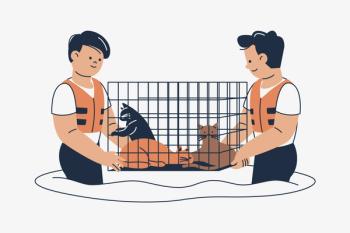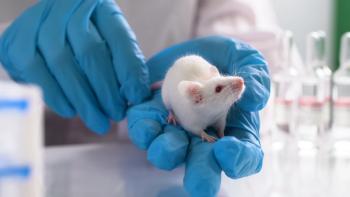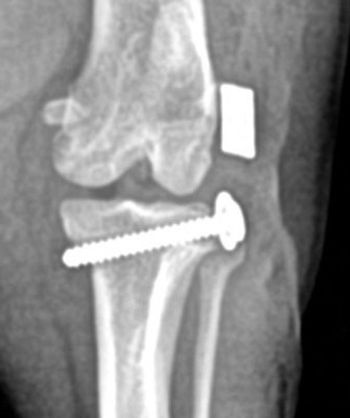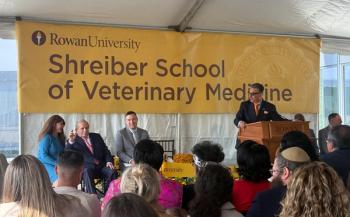
Animal welfare Panelists delve into top professional issues facing veterinary medicine
Editor's Note: DVM Newsmagazine asked six thought-leaders to talk about five of the most pressing issues facing the veterinary profession at CVC East in Baltimore. During the succeeding months, each of the issues introduced at the first DVM Newsmaker's Summit will be presented for publication. This month, the panel takes on animal welfare and veterinary medicine's important role. Dr. Bonnie Beaver introduced the issue of animal welfare.
Editor's Note: DVM Newsmagazine asked six thought-leaders to talk about five of the most pressing issues facing the veterinary profession at CVC East in Baltimore. During the succeeding months, each of the issues introduced at the first DVM Newsmaker's Summit will be presented for publication. This month, the panel takes on animal welfare and veterinary medicine's important role. Dr. Bonnie Beaver introduced the issue of animal welfare.
Coming next month: Specialization: A changing market
About the panelists:
Dr. Bonnie Beaver, Texas A&M University, former president of the American Veterinary Medical Association.
Dr. Gary I. Block, Ocean State Veterinary Specialists in East Greenwich, Rhode Island; former president of the Rhode Island Veterinary Medical Association.
Dr. Joan Hendricks, dean of the University of Pennsylvania School of Veterinary Medicine.
Dr. Lonnie King, director of strategic innovation for the Centers for Disease Control and Prevention; former dean of the Michigan State University College of Veterinary Medicine.
Dr. David Lane, practitioner and consultant in Cardondale, Ill.
Moderator Kerry M. Richard, attorney with Tobin, O'Connor, Ewing and Richard in Washington, D.C.
Dr. Jack O. Walther, practitioner in Lamoille, Nev., and former AVMA president.
Issue introduction by Dr. Beaver: Animal welfare is about the physiological and psychological well-being of animals. It is something that is measurable through studies. Another definition of animal welfare would be to ensure a good quality of life and a humane death. This is in contrast to an animal rights philosophy, which is more focused on a philosophical or an ethical type of discussion.
There are a number of reasons why animal welfare has suddenly become highly visible to the public as well as to our profession. One of the primary reasons is that we're confronted with a shift of population from rural to city areas. Ninety seven percent or more of the people in this country are at least three generations off the farm. So many of them have a total disconnect between what it takes to produce animals and what they think animals should be experiencing.
We're experiencing good economic times; production is high, it takes very few farmers per person and we don't have to spend much of our income in order to get food.
There has also been a great change in animal information sources. People aren't just watching animals in their backyards or in pastures any more. They now learn more about animals from Animal Planet, and I dare say probably know more about African animals than they do about domestic animals.
There are changes also in human-animal relations. Intensified agriculture has put a great change in how we produce animals. Horses are no longer considered livestock in the traditional sense by many. They are now considered, in fact, pets.
And the public has an extremely mixed viewed of dogs and cats. It's been described as schizophrenic. While some people are willing to call them children or child equivalents, for a large percent, euthanasia and disposal is a very common alternative to having to keep an animal around.
Dr. Gary I. Block
We also have societal influences playing a role because we are finding changes in public sentiment. They are looking at animals in a different way because of their urban backgrounds. Veterinarians have unique roles because the public views us as animal welfare experts, and we have the uniqueness of being able to interface both with the animal owner and with the public.
Yet, there is also reluctance by veterinarians to be leaders in animal welfare. In part, it's because we feel a great discomfort in participating in these ethical discussions. It's easier to just kind of "do our thing" rather than get out and look at these specific issues.
There is a change in veterinary schools today as well. They represent the public, including the part about being three generations off the farm.
The relationship with the animal industry is changing. In the old days, 30 to 40 years ago, one rural veterinarian often had 40, 50, 60, 70 farms that he or she would call on as clients. Today that same veterinarian may work for one very large animal industry client.
As times and society change, it is important for our profession to continue as leaders in animal welfare. There will be challenges to that leadership, but remaining focused and proactive toward the goal is the real challenge.
Dr. Joan Hendricks
Ms. Richard: I think that Dr. Beaver has hit on a number of issues. For starters I'm going to turn this over to our panel for their input, but I would like to point out the importance of one point in that animal rights is different than animal welfare. While I think that's absolutely true, the public perspective blurs the line very regularly. I would love to hear what some of our panelists' experiences are on that subject.
Dr. Block: I am very flattered to be on the panel with so many people who are so committed to organized veterinary medicine, it's really an honor. That said, I take some issue with some of Dr. Beaver's comments. I think this is one of the common misconceptions or misstatements about this welfare/rights dichotomy.
Welfare is consistently defined as value free, ethics free. Dr. Beaver suggested that it is something that's quantifiable, measurable, where animal rights conjures up more of an emotional/personal feel. When we look at the definitions of animal welfare though, we think about things like absence of pain, absence of suffering; I think Dr. Beaver referred to it as a good life. Those are clearly subjective and ethical definitions of this term welfare. I don't want to get bogged down on semantics, but I bring it up because the question touches on the 'rights' terminology as the moral currency that we use in our society. The public embraces it, and the AVMA for all intents and purposes has not embraced it.
Dr. Lonnie King
I would argue that a lot of the friction going on when it comes to the rights versus welfare debate is that the AVMA intentionally or unintentionally has drawn a line in the sand against animal rights' activists who paint every person who believes in animals rights as being members of PETA, being uninformed, believing that animal's rights are equivalent to human rights and believing that if you embrace the concept of animal rights, you're essentially embracing the demise of veterinary medicine.
I think that we all believe animals have some rights; they're either codified in law or they're commonly held beliefs by the public.
When it comes to the rights that animals have, I think AVMA has been reluctant to embrace this dialogue using that as moral currency. In that, they have lost their leadership on the issue of animal welfare because they've resisted this concept so vehemently.
Dr. Hendricks: I love that we have a lawyer as a moderator. And as a full disclosure, my daughter is in law school at Berkeley. At Berkeley, she worked at a free speech law clinic and wound up on the defending side, as far as gathering information, for the Huntington Life Sciences situation, which did not make her mom happy. It was interesting for me to go through that.
There's an enormous growth in animal law specialization and interest in law schools, yet there is a kind of head in the sand or running away response I think among veterinarians. There are so many important issues about the legal status of animals that it's a real shame. Lawyers love to argue — that's the deal, that's the job — and in spite of Gary, most veterinarians don't love it at all.
Dr. Jack Walther
I'm seeing a tremendous interest in our students engaging in issues of animal welfare because if they say animal rights, we won't talk to them. And they're tremendously interested in the issues of animals that we care for, which serve us as pets but also as lab animals or to make food or fiber, or other things. They're interested in engaging and making those animals lives better without arguing the ethics.
I would be very interested in what Dr. Beaver thinks about of all the issues that she's addressed which ones we can change.
Dr. Beaver: I think that we need to work on allowing students to learn how to gather information so that when they enter into discussions about these issues, their attitudes are based on science. To engage in animal rights' discussions are difficult because they are often based on personal opinions. But it is often important to recognize that discussions about animal welfare include those philosophical components, too. Such as, is it good to keep pigs on straw? Do they need to be able to turn around? That isn't strictly an animal rights issue; it really is a welfare issue because we can measure if they are more active, rest more and show other physiological and behavioral signs of comfort or discomfort. In reality, many of the things that we want to dump into an animal rights' discussion are about animal welfare.
Traditionally, scientists are very uncomfortable with philosophical debates. I could design a study to prove or disprove the comfort of pigs on straw and whether it makes them more productive. Do they lie down? Do they move? Do they have a lower heart rate, lower cortisol levels? A number of things can be measured.
I think what we really need to focus on is what is good welfare and where veterinary medicine needs to be positioned in that arena.
Ms. Richard: Through my involvement with American Veterinary Medical Law Association (AVMLA) I can tell you that animal law is the single fastest-growing area of law. All the upper-tier law schools have added animal law sections, and the AVMLA has been very proactive in going out and soliciting involvement in those animal law sections for the sake of making sure veterinary legal interests are taught and represented. Basically we've been excluded in most venues. We found it a very hostile group to veterinary issues.
Veterinarians should be at the forefront of the discussion and of the teaching of animal welfare and animal legal issues, and they don't even want us at the table at this point.
Dr. King: At Michigan State, we recently developed a new association with our law school. We actually have lawyers coming over and doing mock-ups and arguments about animal welfare, animal rights and a lot of other issues. And our students really like that, and they are engaged in these issues. I think they are starting to understand the legal implications, and I think it's been a good relationship. We also have a DVM/JD program and are getting a couple students per class that are interested. More and more law schools are creating and offering a course in animal law.
One of things I wanted to ask Dr. Beaver is an interesting phenomenon that I've seen from the food animal side is this issue of emotional food.
I see the shift going from production, agriculture and veterinary medicine over to retailers. For example, McDonald's is setting standards for production practices for food animals rather than producers themselves. And they are setting the standards and actually turning that into a brand image in terms of their food.
So it's the emotion of the food, and if you're eating our products, you know that our animals have been well taken care of, etc. In societies where you have this high level of disposable income, like the U.S. and Western Europe, people are starting to make up their minds and decisions based on the social acceptance of the food, how is it produced, its environmental practices and more and more about animal welfare.
So, Dr. Beaver I don't know if you've seen this, but it looks to me like there's kind of a shift in the argument away from production agriculture to retailers who are actually forcing that issue.
Dr. Beaver: It is interesting to look at that movement and how it has taken off. Groups that used to picket farms, now are picketing large companies. They are hitting them in the pocketbook in an attempt to force them into making some of these changes. They are forcing agriculture to take a look at some of its farming practices, which is not entirely a bad situation. Agriculture has traditionally kind of stepped back and said this is the way we've always done it and this is the way we're going to have to do it in order to produce cheap food for the table. And now the public is starting to say cheap is not necessarily what we want. It's not the only factor for consumers, and in fact several studies are showing they are willing to pay more for food that is produced in what, from their perspective, is a more humane way. So at least some companies are embracing this and telling the producer we want these animals raised in certain ways. There's a bit of a disconnect there, too, because many times some of these companies do not realize what is involved in production, and they may not be totally realistic in what they are asking. But the animal industry is starting to wake up and say, give us a certain number of years to do some research and come up with the answers.
I think there was a real interesting example of this in Australia where PETA actually attacked the wool industry for a technique called mulesing, where they cut a big patch off the rump to unwrinkle the skin. The Australian wool industry recognized the attack and decided to educate their buyers about why the procedure is necessary in order to produce the quality of wool demanded without allowing fly strike to kill sheep. They also committed the next 10 years to do the research, change the genetics and try to unwrinkle these particular sheep and retain the quality of wool. So animal rights' activists woke up an industry, but the industry also went on the offensive and started educating their producers about what it takes.
Dr. Walther: I would like to comment on Dr. Block's statement as far as AVMA's position on animal welfare vs. animal rights.
He is right in saying that AVMA is leaning toward a position of animal welfare because, quite frankly, that's where most veterinarians are from a philosophical perspective. AVMA represents most veterinarians, not all, but most. We recognized at AVMA, and Dr. Beaver was certainly a leader in this movement, that it was going to be difficult for veterinarians to take a strong position on these issues, and yet it is for the protection of animals. We probably have defined animal welfare as the goal of the profession, but that doesn't mean we're not working with particular groups that fall in the middle. For example, the Humane Society of United States represents an animal rights' philosophy, yet they're far less radical, far more realistic about the position that veterinarians are taking.
Dr. Lane: One of the things that strikes me about this whole issue is that we can't just do position papers and go home. We really need to be able to get the ear of the public. Right now the ear belongs to the animal rights' side, and we really don't have a good way of getting out from our little huddle, at AVMA or AAHA, to demonstrate what that is. It means the AVMA has to find a unique and unified voice so that we can recapture the ear of the public.
We've gone from growing agriculture to a relational companion animal culture, and the public itself needs to be educated. It's going to take money and manpower as Dr. Walther has said to really do this. I think what we really need is to get out of the huddle and get this in a public forum. We need to speak directly on these issues rather than just shuffling papers among ourselves.
Dr. Block: One of the questions that I posed to myself when I was preparing for this was whether these animal welfare/rights organizations are creating public opinion on this issue or reflecting public opinion.
I guess my impression is they're picking up on the public's dissatisfaction with the way animals are currently being treated. I might add that the class of veterinarians graduating from our veterinary schools today is probably moving more toward a rights' orientation than a welfare orientation with regard to AVMA positions.
I have one example that I think illustrates my concerns. There was a bill if I'm not mistaken that would have protected habitat for endangered wild cats and wild dogs — not feral dogs and cats, but wild species. It was an environmental issue. You know the public was supportive of it, but the AVMA came out against that bill if I'm not mistaken in part because it brought up some one of those competing agricultural issues in that a Gray wolf would occasionally eat some of the livestock on some of these farms. That to me doesn't strike of leadership; that to me doesn't ring true to reflecting the public or majority veterinary sentiment. We can do all the educating in the world on why the AVMA didn't support the bill on that issue, but it's a huge PR loser. I really have a tremendous amount of pride in our profession and respect. Public trust in our integrity is so important. If we don't look in the mirror about some of these issues that I think we haven't fully addressed adequately, we're going to lose that very faith and trust that the public put in us after all these years.
Dr. Beaver: I would like to make a quick rebuttal to that in that it's very easy to say a bill that looks at the care for wild cats or carnivores seems great, without looking at the wording in the bill. You've got to be extremely careful because many of these bills that sound good by title have parts that can actually be extremely detrimental to the long-term welfare of animals.
We have legislative committees at AVMA that look very intensely and very thoroughly at this type of legislation before we decide which bills to support, to oppose or be neutral on.
Newsletter
From exam room tips to practice management insights, get trusted veterinary news delivered straight to your inbox—subscribe to dvm360.




